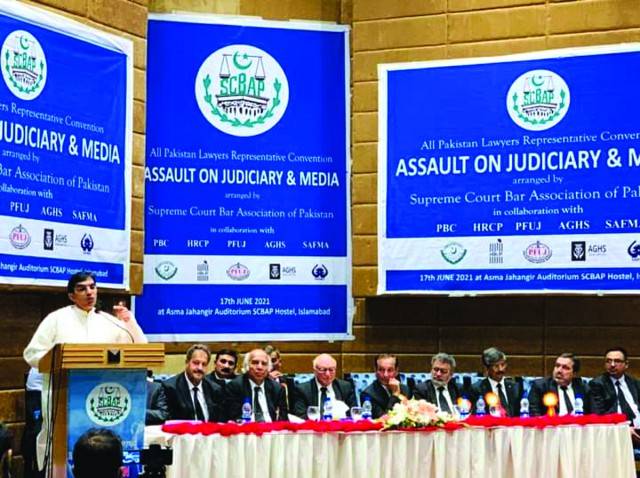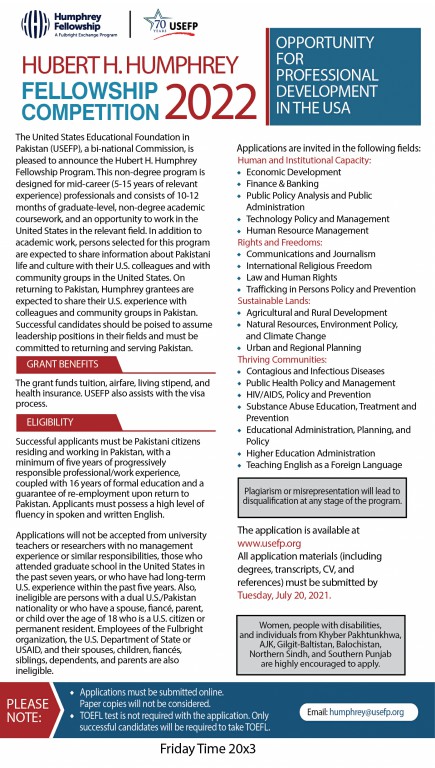
Emerging threats to the democracy’s twin pillars - the judiciary and the media - were discussed in a seminar on Thursday in Islamabad. The seminar Assault on Judiciary and Media was organized by the Supreme Court Bar Association in association with the PFUJ, HRCP and other human rights bodies.
The assault on media and freedom of expression has acquired new dimensions. Formal censorship has been replaced with what the Supreme Court described in its 2019 verdict in Faizabad dharna case as “nebulous tactics.”
These nebulous tactics, according to the court, included “issuing advice to self-censor, to suppress independent viewpoints, to project prescribed ones, to direct who should be hired or fired from media organizations.” The court declared them illegal.
Lately, these tactics are increasingly employed not only by the political arm of the ‘same-page’ dispensation, but also independently by the military, militant groups and many others.
At the root of the problem is the silent, creeping coup that has taken place in the country. It lies in the rise of an unaccountable de-facto arm of the state against the de-jure arm of the state.
Thus, in November 2017, the de-jure was forced to surrender before the Tehrik Labbaik Pakistan (TLP) mob at Faizabad.
Interesting revelations might be made if investigations are carried out into who drafted the document of surrender then and more recently, about the pledge made to TLP militants to expel the French ambassador.
There is inadequate protection of laws on the one hand and the misuse of existing ones, like Pakistan Electronic Crimes Act (PECA) 2016, on the other.
As if this was not enough, there is total impunity for crimes against journalists, social media activists and bloggers. Asad Toor, Matiullah Jan, Absar Alam, and Hamid Mir before them, are some recent examples. Those who escape physical harm are subjected to character assassination by paid trolls as Asma Shirazi and others.
A deliberate and calculated assault has been launched by the state against the consciousness of thinking people. All instruments that give voice to the consciousness of people whether it is media, books or films are the targets of this assault.
With the rise of ‘citizen journalist’ on the one hand and the ascendancy of a security-driven de-facto state in the hybrid regime in Pakistan, this war has been intensified.
The media thus is free to demonize and denigrate politics, politicians, parliament, political parties and all civilian democratic structures. This façade has prompted the prime minister to even claim “media in Pakistan is freer than the western media.”
But challenging the state security narrative and presenting alternative policies has been made dangerous. It can invite anything from hounding by trolls, to accusations of blasphemy to summons by FIA under the PECA, to getting sacked by the media house and to abductions and murder with total impunity.

The mainstream media is free to report the loss of lives and damages but not counter terrorism operations.
Thus, sometime back when militant commander Nek Muhammad was killed in Waziristan and the security forces claimed credit for it, the media headlined it. But when journalist Hayatullah took the pictures of the compound and the missiles, it transpired that the weapon was not part of Pakistan army arsenal. Hayatullah disappeared, and six months later his dead body was found dumped.
Because of such pressures, mainstream media did not report the rise of Pashtun Tahaffuz Movement (PTM), the Jani Khel dharna and the incident in Kharqamar in North Waziristan. It cannot question why the tribal areas have been kept as a blackhole despite the merger, or the regrouping and cross-border movement of militants. It finds it expedient not to ask questions about allotment of scores of acres of land in post-retirement benefits.
Much the same way as the discovery of Osama Bin Laden in a cantonment, the Kargil misadventure and blaming nuclear proliferation on one lone individual have not been questioned.
The structure of the Pakistani state is that of a garrison state. It is not a welfare driven state. In such a state, power is concentrated in the hands of a few individuals in the garrison and not diffused in institutions. It is in the nature of power that the wielder seeks to control the thought and speech of all others so as to protect their narrative from being challenged.
Therefore, the answer is greater democracy. In a democracy, power is diffused in different centers, namely the parliament, the media, the bar and the bench and many others. Democracy is also a barrier against policies to be made by the barrel of the gun.
The answer lies in greater transparency, free discourse and greater use of the Right to Information (RTI) law to tear apart the shroud of secrecy.
The security establishment believes that it is fighting a hybrid war and media manipulation will serve as its force multiplier in winning this war.
The Pakistani state’s existential war is against militants and their jihadi narrative, not against media or judiciary. It is not possible to win this war without freedom of expression, academic freedoms and without abandoning the state of denial we live in.
We need to build intellectual infrastructure. This infrastructure will not be built in garrisons. It will be built in universities, colleges and academic institutions. It can be built only in an environment of freedom of expression and dissent.
The military’s understanding of the 5G war is flawed. The Supreme Court in the Faizabad dharna case also observed, “Those who resort to such tactics under the mistaken belief that they serve some higher goal delude themselves.”
The real 5G war is the unwitting war waged by the state itself against a resurgent society yearning for freedom of thought and freedom of speech. Make no mistake. If this war was lost by society, the state will not win it either.
With its moral and intellectual foundations weakened, a state may exist but only as a dead body and not as a living and vibrant spirit.
The writer, a former senator, also spoke at the seminar
The assault on media and freedom of expression has acquired new dimensions. Formal censorship has been replaced with what the Supreme Court described in its 2019 verdict in Faizabad dharna case as “nebulous tactics.”
These nebulous tactics, according to the court, included “issuing advice to self-censor, to suppress independent viewpoints, to project prescribed ones, to direct who should be hired or fired from media organizations.” The court declared them illegal.
Lately, these tactics are increasingly employed not only by the political arm of the ‘same-page’ dispensation, but also independently by the military, militant groups and many others.
At the root of the problem is the silent, creeping coup that has taken place in the country. It lies in the rise of an unaccountable de-facto arm of the state against the de-jure arm of the state.
Thus, in November 2017, the de-jure was forced to surrender before the Tehrik Labbaik Pakistan (TLP) mob at Faizabad.
Interesting revelations might be made if investigations are carried out into who drafted the document of surrender then and more recently, about the pledge made to TLP militants to expel the French ambassador.
There is inadequate protection of laws on the one hand and the misuse of existing ones, like Pakistan Electronic Crimes Act (PECA) 2016, on the other.
As if this was not enough, there is total impunity for crimes against journalists, social media activists and bloggers. Asad Toor, Matiullah Jan, Absar Alam, and Hamid Mir before them, are some recent examples. Those who escape physical harm are subjected to character assassination by paid trolls as Asma Shirazi and others.
A deliberate and calculated assault has been launched by the state against the consciousness of thinking people. All instruments that give voice to the consciousness of people whether it is media, books or films are the targets of this assault.
The real 5G war is the unwitting war waged by the state itself against a resurgent society yearning for freedom of thought and speech
With the rise of ‘citizen journalist’ on the one hand and the ascendancy of a security-driven de-facto state in the hybrid regime in Pakistan, this war has been intensified.
The media thus is free to demonize and denigrate politics, politicians, parliament, political parties and all civilian democratic structures. This façade has prompted the prime minister to even claim “media in Pakistan is freer than the western media.”
But challenging the state security narrative and presenting alternative policies has been made dangerous. It can invite anything from hounding by trolls, to accusations of blasphemy to summons by FIA under the PECA, to getting sacked by the media house and to abductions and murder with total impunity.

The mainstream media is free to report the loss of lives and damages but not counter terrorism operations.
Thus, sometime back when militant commander Nek Muhammad was killed in Waziristan and the security forces claimed credit for it, the media headlined it. But when journalist Hayatullah took the pictures of the compound and the missiles, it transpired that the weapon was not part of Pakistan army arsenal. Hayatullah disappeared, and six months later his dead body was found dumped.
Because of such pressures, mainstream media did not report the rise of Pashtun Tahaffuz Movement (PTM), the Jani Khel dharna and the incident in Kharqamar in North Waziristan. It cannot question why the tribal areas have been kept as a blackhole despite the merger, or the regrouping and cross-border movement of militants. It finds it expedient not to ask questions about allotment of scores of acres of land in post-retirement benefits.
Much the same way as the discovery of Osama Bin Laden in a cantonment, the Kargil misadventure and blaming nuclear proliferation on one lone individual have not been questioned.
The structure of the Pakistani state is that of a garrison state. It is not a welfare driven state. In such a state, power is concentrated in the hands of a few individuals in the garrison and not diffused in institutions. It is in the nature of power that the wielder seeks to control the thought and speech of all others so as to protect their narrative from being challenged.
Therefore, the answer is greater democracy. In a democracy, power is diffused in different centers, namely the parliament, the media, the bar and the bench and many others. Democracy is also a barrier against policies to be made by the barrel of the gun.
The answer lies in greater transparency, free discourse and greater use of the Right to Information (RTI) law to tear apart the shroud of secrecy.
The security establishment believes that it is fighting a hybrid war and media manipulation will serve as its force multiplier in winning this war.
The Pakistani state’s existential war is against militants and their jihadi narrative, not against media or judiciary. It is not possible to win this war without freedom of expression, academic freedoms and without abandoning the state of denial we live in.
We need to build intellectual infrastructure. This infrastructure will not be built in garrisons. It will be built in universities, colleges and academic institutions. It can be built only in an environment of freedom of expression and dissent.
The military’s understanding of the 5G war is flawed. The Supreme Court in the Faizabad dharna case also observed, “Those who resort to such tactics under the mistaken belief that they serve some higher goal delude themselves.”
The real 5G war is the unwitting war waged by the state itself against a resurgent society yearning for freedom of thought and freedom of speech. Make no mistake. If this war was lost by society, the state will not win it either.
With its moral and intellectual foundations weakened, a state may exist but only as a dead body and not as a living and vibrant spirit.
The writer, a former senator, also spoke at the seminar

